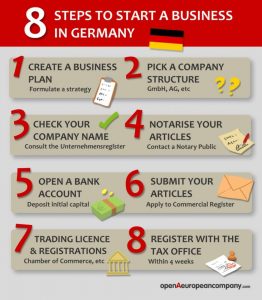Germany is the seventh largest country in Europe and is known to have one of the strongest economies in the region. This nation is home to some of the most iconic companies in the world. This includes car manufacturers such as Volkswagen, Mercedes- Benz, BMW, and Audi. The country.
Germany is also known for its advanced technology companies such as SAP and Siemens. Such companies have thrived because the country offers a great business environment for business owners. Let’s examine some of the benefits of starting a business in Germany.
-
Strong and Stable Economy
Germany has one of the strongest and most stable economies in Europe. This can be attributed to the country’s heavy focus on exports and innovation. In fact, Germany is the EU country responsible for 29% of all exports to non-EU countries. It remains an open economy with a foreign trade quota of 84.4%. By contrast, the United States’ foreign trade quota is only 26.7%.
Germany’s continual progress in the manufacturing sectors has also ensured that plenty of countries will always be dependent on its exports. This leads to the country’s stability and ensures that its economy will always be a key player on the international stage with its business stats.
-
Access to a New Customer Base
Germany is one of the wealthiest countries in Europe with a GDP per capita of $50,800. The average gross annual salary in the country varies from $63,000 to $80,000. This means that Germans have plenty of money to spend on goods and services.
Entrepreneurs who start a business in Germany will have access to a consumer base with lots of disposable income and high spending power. This means they can offer a variety of premium goods and services without worrying whether people can afford them.
This is one of the main reasons why entrepreneurs from countries where the average citizen has poor spending power opt to start businesses in Germany instead of their home country. However, it is important to note that certain German industries such as the automotive industry and manufacturing are highly saturated, so business owners should think twice about starting a business in these industries in the country.
-
Access to a Highly Skilled Labor Pool
Many businesses set up shops in Germany to take advantage of the country’s highly-skilled labour pool. The country has some of the most distinguished facilities for higher learning. This includes places such as Technische Universität München, Ludwig-Maximilians-Universität München, and Ruprecht-Karls-Universität Heidelberg.
Such higher-educational institutions churn out tens of thousands of highly-educated individuals with desirable skill sets each year. Some of these graduates move abroad and find high-paying jobs in other countries. However, the vast majority stay in Germany and become part of its 42 million-person-strong workforce.
Entrepreneurs and business owners who start businesses in Germany will therefore have access to this pool of highly-skilled workers. This makes Germany a great choice for businesses seeking workers with degrees in mathematics, engineering, natural sciences, statistics, and computer sciences.
-
Excellent Protection for Ideas and Concepts
Every business owner should understand the importance of protecting their ideas and concepts. After all, someone may have a million-dollar idea for their business, but others could steal this idea and profit off it if there aren’t any legal protections in place. The good news is that Germany offers many protections for such ideas and concepts.
Intellectual property is protected under many acts such as:
- The Copyright Act (UrhG),
- The Trademark Act (MarkenG),
- The Patent Act (PatG),
- The Utility Model Act (GebrMG),
- The Act Against Unfair Competition (UWG).
- The Designs Act (GeschMG),
In addition to this, Germany’s civil code is embedded with many provisions pertaining to protecting intellectual property. All these provisions mean a business idea or concept will be well-protected in Germany and that any person or entity that attempts to steal and profit off them will be heavily penalized.
Germany’s Competition Laws also mean that people cannot make false claims about a business. Any individual or entity that does so will be charged with a crime.
-
Existing Startup Culture
The recent surge in startups globally has altered the trajectory of many industries and spurred many different types of innovation. It is estimated that 26,000 startups are registered in the EU each year. Around 2,600 of these are registered in Germany.
NimbleFins, a research and analysis group that conducts studies on businesses in Europe ranked Germany as the #1 place for startups in 2019 and 2020. The group conducted their assessment based on factors such as economic health, cost of doing business, business climate, and labour force quality.
The organization cited Germany’s excellent access to venture capital as the main reason for its top ranking. There are estimated to be over 764 venture capital funds in the country, which means startup founders should have no problem approaching various fund providers to invest their ideas.
-
Investment Incentives
Venture capital fund providers aren’t the only way for new businesses to get funding in Germany. There are also numerous public funding instruments that business owners and entrepreneurs can rely on. This includes:
GRW Cash Grants
Gemeinschaftsaufgabe Verbesserung der regionalen Wirtschaftsstruktur, or GRW, is a special investment program aimed at creating new jobs and supporting economic development in the country. It provides grants for businesses in the manufacturing and service sectors to help cover part of their setup costs.
This includes funding to cover their capital expenditures such as purchasing machinery, equipment, and new buildings within the business’s first three years. It also covers personnel costs for businesses that have created new jobs for two years.
Research and Development Grants
The German government has also committed to spend approximately 3% of its GDP to fund research and development. It has created numerous programs explicitly for this purpose.
For example, KMU-innovativ is a funding scheme that offers funding for small and medium-sized businesses that focus on high-tech strategy technologies. The scheme provides funding on an ongoing basis and isn’t limited to any specific research areas.
Hiring Grants
The German Federal government has included many labour-related incentives for businesses. This includes:
- Support when businesses are searching for staff
- Grants to support employee training programs
- Wage subsidies after hiring unemployed workers
-
Greater Exposure
Setting up a business in Germany is also a great idea for businesses that wish to gain more exposure. As mentioned earlier, the German population has high spending power. However, the country also receives a large number of tourists.
It is estimated that Germany was receiving up to 39 million tourists per year before the COVID-19 pandemic hit. The average tourist in Germany spends approximately $1,475 on their trips, meaning that businesses can expect tourists to contribute to a significant part of their revenue. This also gives local businesses greater exposure, which may help them attract business if they set up shop in other countries.
Germany is also considered the #1 location for trade shows. There are an estimated 160 to 180 national and international trade fairs held in the country each year. These attract ten million visitors and serve as excellent locations for businesses to get greater exposure. Business owners should therefore strive to exhibit their business at these shows to benefit from the special exposure they provide. Such exposure can boost their chances of succeeding internationally in the future.
-
No Language Barrier
The language barrier can be the source of many problems for foreign entrepreneurs and business owners who wish to set up businesses in European countries. It can be difficult to understand laws and regulations written in a foreign language as well as interact with locals who don’t speak English.
Such problems aren’t likely to be an issue for people who start a business in Germany. Around 56% of Germans speak English, and business activities are often conducted in English in the country’s metropolitan and tourist areas. This means foreign business owners won’t need to worry about the language barrier when they set up shop in Germany.
Any language barrier issues are also likely to get smoothened over as the business hires more local workers who speak both German and English.
Why Choose OpenaEuropeanCompany?
As you can see, there are plenty of benefits associated with starting or expanding a business in Germany. However, the process of setting up a business properly while navigating through the country’s various business laws can be challenging to do on your own. Entrepreneurs and prospective business owners who need assistance with this should reach out to OpenAEuropeanCompany for assistance. We understand German business laws and can guide you through the business setup process correctly. Please contact us today to learn more about our services.








